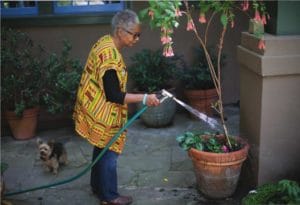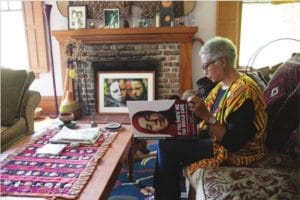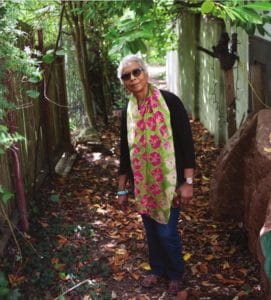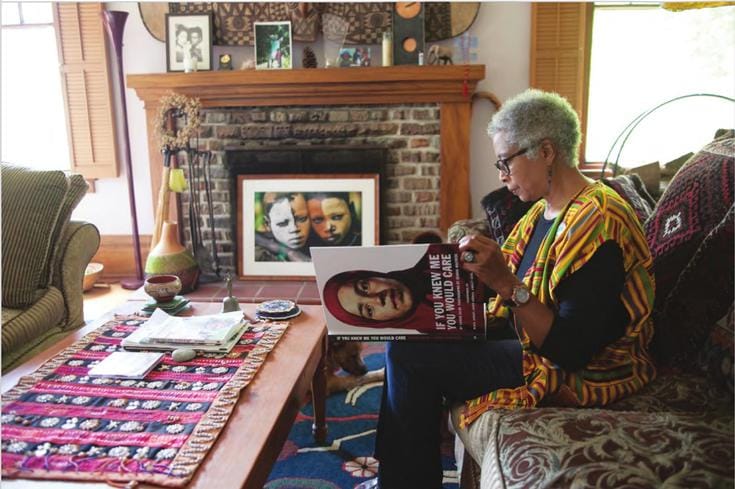If The Color Purple is a “Buddha book that’s not Buddhism”—as author Alice Walker once described her Pulitzer Prize winning novel—Walker’s own spirituality might be called a Buddha path that’s not Buddhist. Walker has long been a meditator, and she credits Pema Chödrön’s teachings on awakening compassion with helping to open her heart, again and again. But Walker doesn’t consider herself Buddhist. She draws on many spiritual teachings and pledges allegiance to none.
As an author and activist, she is known for searing portraits of difficult subjects, but when I meet her on a warm afternoon in Berkeley, California, she radiates a quiet wonder and steadfast appreciation for the unadorned bounty of the Earth, including the red Russian kale leaf that seems to grow bigger by the minute in the planter bed in her garden. “The one that looked as big as my hand last night is almost twice as big as my hand now,” she says. “That’s what I like to watch.”
Walker greets me just inside the garden gate at her home, wearing a soft, loose-fitting, blue linen outfit, her hair short and smoky gray. She leads me briskly through the sun-drenched garden to the living room, past a bench lined with copies of her latest books, and settles on her sofa, legs outstretched.
Walker is not one to stay within prescribed lines or to heed perceived limitations, whether in her spiritual path, her art, or her life. She has loved and partnered with men and women.
She’s a poet, novelist, essayist, and blogger whose writing has garnered both lavish praise and stinging criticism. She’s an activist, seeker, and meditator — though for Walker meditation comes in as many varieties and uses as the kale she blends into breakfast smoothies or sautés for supper.
This year, Walker celebrates the thirtieth anniversary of her Pulitzer Prize (and National Book Award) for The Color Purple and the release of Beauty in Truth, a documentary about her life that premiered in London to sold-out crowds. She has published more than thirty books, most recently poetry (The World Will Follow Joy) and journal-like essays (The Cushion in the Road: Meditation and Wandering as the Whole World Awakens to Being in Harm’s Way). Early next year, she will turn seventy.
Pratibha Parmar, the director of Beauty in Truth, felt “transported safely across the threshold of another world full of possibilities” the first time she read Walker. The book was In Search of Our Mothers’ Gardens. And what is a garden if not a world of possibility? Walker loves to plant seeds and see what grows, just as her mother did before her. “Hers was a literal garden,” she says, “but my garden is basically everything.”
Preparing the Ground
Walker was born in a community named for its church: Ward’s Chapel, Georgia, just outside of Eatonton. As a child, she could often be found behind a book or rambling outdoors. Sipping tea from a plain white mug, she tells me that her family accepted her love for solitude and nature, though they experienced it at times as distancing or just plain spaciness. “When you grow up in a small house with many people in it, the interior space, if you’re fortunate, becomes very spacious. In my case, it did.”
Walker’s parents, Minnie Lou and Willie Lee Walker, were sharecroppers, with numerous mouths to feed and not much money to spare. Minnie Lou would return from a long day of laboring on someone else’s land to tend her beloved flower beds. The family belonged to the African Methodist Episcopal church and were, as Walker puts it, “deeply Christian. They really believed in the teachings of Jesus.” Whereas Walker’s siblings were made to attend services on Sundays, by the time she reached her teenage years—the last of eight children — her parents lacked the energy for enforcement. Walker fell away from the church and its gospel, drawn to the inspiration she discovered right outside her front door. She watched storms and the wind that carried them. She observed her mother’s garden bloom and fade. She strolled through the forest. “It was like walking meditation but without any trappings,” she says. “You were just there in the middle of a miracle, aware that everything was not only connected to you but coming through you.”
Walker wrote from an early age — exploring what she calls the “foreign territory” inside the self — scribbling in the margins of catalogs. But the pivotal moment of her childhood, the one that made her a writer dedicated to truthful depiction of the world around her, was an accident she didn’t speak or write about for years. She was eight years old, playing cowboys and Indians, when one of her brothers shot a BB gun and pierced her right eye. The pain was excruciating, the scar tissue disfiguring. It took the family a week after the injury to gather enough money for a doctor. “He said — right in front of me and my parents — ‘If one eye is blind, the other will become blind,’” Walker remembers. “It sparked in me a real desire to see before I could not see.” While she eventually had surgery to remove the scar tissue, Walker never recovered the vision in her right eye. “That in itself has been a discipline. To see clearly, to affirm what is actually happening as opposed to what you may be told is happening.”
In 1961, Walker enrolled at Spelman College in Atlanta. Boarding the bus to college, Walker sat in front, and when a white woman complained, the driver ordered her to move to the back. Walker knew then she would join the struggle for freedom, and as the civil rights movement grew, the aspiring young writer and activist began to feel stifled at Spelman. After a favorite professor — historian-activist Howard Zinn — was fired, presumably for his progressive views, she transferred in 1964 to Sarah Lawrence College in New York State on a full scholarship. There, Walker studied with the poet Murial Rukeyser, who was so impressed by the poems her student pushed under her door that she forwarded Walker’s work to her own agent. The poems were eventually published in Walker’s first book, Once. Another pivotal moment came on Walker’s second day on campus. Browsing the bookstore, she discovered a Zen poem:
Sitting quietly,
doing nothing,
spring comes,
and the grass grows by itself.
It was a moment of recognition, of connection to her experience of nature as a child. It was all right there, says Walker, a consciousness-raising in language so simple and direct. “In those few lines, you get the information and the wisdom that things are moving in their own way.
Planting Seeds
Each chair around Walker’s large dining table is a different color — bright hues of green, orange, and yellow. Artwork fills the room: a painting of Billie Holiday by an artist in Amsterdam and a wooden sculpture inspired by Walker’s novel The Temple of My Familiar. There’s a packed bookshelf in an adjacent room. The house feels lived in, cared for.

Just as we begin to discuss Walker’s early career — her civil rights work, marriage and motherhood, and ascent as a celebrated writer — there’s a burst of barking from the front of the house. “There’s my little Yorkie!” says Walker. But instead a medium-sized dog named Ziggy who belongs to a friend pads into the room and then disappears, followed by a tan-and-white mixed breed named Miles who plunks down next to Walker between the sofa and the coffee table.
In 1966, Walker received her diploma from Sarah Lawrence and packed her bags for Mississippi. She’d accepted a job with the NAACP in one of the toughest environments in the Jim Crow South. Her first assignment was to interview black sharecroppers evicted from their homes for attempting to register to vote. There, Walker met Melvyn Leventhal, a Jewish lawyer working for the civil rights movement, and they fell in love. Years of both fruition and heartbreak followed.
Walker and her husband’s work in Mississippi — not to mention their union — was dangerous. They were menaced by racist taunts, threatening phone calls, and hostile letters. Despite the obstacles, the couple married and had a daughter, Rebecca. In 1970, Walker published her first novel, The Third Life of Grange Copeland, about the depredations of a sharecropping family in Georgia, followed by collections of poems and stories. But the racist atmosphere in Mississippi took a toll on Walker, and by 1974, she wanted out. She moved to New York City, became an editor at Ms. Magazine and a teacher at Wellesley. In 1976, she divorced Leventhal, whom she still loved. “Mississippi, with all its hatreds and hardships, had worn them out,” writes Walker’s biographer, Evelyn C. White.
Walker’s star was rising as a writer, but not without some clouds. After the dissolution of her marriage, caught between motherhood and her dedication to the solitary craft of writing, Walker struggled with depression. “I have my despairs,” she tells me. “Despair happens. But I have a faith in my own ability to speak on it, whatever the disaster is, whatever seems to call for consciousness.” Poetry had often rescued Walker from dark spells after calamity — the eye injury, an abortion during college. This time, in addition to pouring herself into her writing, Walker turned to meditation. She wasn’t immediately encouraged when she first sat down on her cushion. But she stuck with it and eventually noticed she felt less agitated, more willing to open to her own suffering.
In 1978, Walker moved to the San Francisco Bay Area. She wanted to leave New York, and she felt a need to go to the countryside, where her characters wanted to be — the ones helping Walker tell their story in the soon-to-be prize-winning novel The Color Purple. The move was a watershed in Walker’s journey as a writer. In 1983, she became the first African American woman to receive the Pulitzer for fiction, the famous author of a book people love or hate or love to hate, even those who’ve never read it, a book that has been praised, blamed, banned from classrooms, made into an Oscar-nominated movie, and staged in a Broadway play.
I asked Walker how she feels now about the novel that is so inseparable from her name. Though she rarely goes back to the book herself, she says she’s grateful for the enduring relevance of a story “about God and what your idea of God is and how you have to get rid of the God that has been forced on you, the deaf, blind one who hates you.”
Walker was surprised by The Color Purple’s reception — both the accolades and the demonization from those who felt the themes of rape, incest, and love between women were prurient or traitorous and demeaning to black men. Feeling attacked, ostracized, and often misrepresented by what was written about her in the wake of the book’s success, Walker learned to trust her own compass. “The way people speak about you is always a reflection of who and where they are,” she says, quoting Pema Chödrön, one of her teachers. Despite the painful backlash,
Walker kept writing. She also founded her own publishing company. Our suffering can bear spiritual fruit, she says now, adding, “Otherwise, I’m not sure we need it.”
In the early days of her meditation practice, Walker had a disciplined daily routine. She’d sit and then she’d write. But she doesn’t meditate every day anymore. “Sitting meditation is great, and I’m not knocking it, but I think that state is meant to be integrated,” she says. “That’s where you can live.”
Now, Walker only writes when something is “writing itself” inside her. Writing can be an affliction, she knows. When she’s involved in the world of her characters, “trying to see six or eight people through various life passages, there’s not enough of me to also be present to the people I live with.”
Walker begins to reflect on what life has brought her when her Yorkshire terrier races into the room. He hurls himself onto Walker’s lap, whirls in circles, wiggles on his back, then hurdles the cushions to stand alert on the back edge of the sofa — close-cropped grooming making his ears appear huge. “Hi Charlie! Mama missed you!” Walker coos, then resumes her train of thought: “I’ve had many loves, family. That’s life — it always gives you just what you don’t expect.”
Like a public rift with your only child. Rebecca Walker — also a writer — has openly aired complaints about the mothering she received, and mother and daughter have not spoken in several years. In our interview, just a few days after Mother’s Day, Walker praises her own mother’s dedication and resourcefulness but doesn’t volunteer details of her troubled relationship with Rebecca. Walker is first a poet, and these resonant lines from “Despair Is the Ground Bounced Back From” in her new collection point to the hurt:
When the best mothering
you can muster
is kicked to the curb
with a sneer…
there is something
to be gained
to be learned
to be
absorbed
even in this pit.
In an email exchange later, Walker acknowledges the pain of the estrangement, but she doesn’t dwell there. “I was turned back to a deeper understanding of what motherhood has meant in traditional African American communities: taking care of, mothering, all the children within reach. This does not make up for losing my only daughter to forces I don’t yet understand, but it does redirect me to something useful, I believe, to the lives of the inheritors of our planet: its children.”
Twenty-five years after she and Leventhal split, Walker published a book of stories written from the ruins of her marriage, The Way Forward Is with a Broken Heart. As it was with her divorce and the blind eye, so it may be with her daughter: it can take time to uncover what the something is to be learned from such a sharp, unexpected, and intimate pain and to wish to speak of it.

Watching What Grows
A lifelong activist, Walker still speaks out regularly on issues that matter to her—Palestine, Cuba, drone warfare, war in general. When I ask if she is encouraged by the Obama presidency, she says she’s not encouraged by “the political system” but is inspired that the American people put Barack Obama and his family in the White House. “I love seeing them there, especially given the history of the White House as a slave-built mansion. That taught us what we can do.”
Walker’s political positions are often uncompromising, but she approaches her activist work like a seasoned meditator, neither wholly optimistic nor solely pessimistic. She is committed to making an effort without being attached to results and knows that transformation must begin close to home. Though we may want to start “over there with those poor people,” says Walker, we always have to start with “our poor selves.” To nurture her meditation practice over the years, Walker has mostly chosen a sangha of her own creation. For ten years, Vipassana teacher and author Jack Kornfield came to Walker’s home in Berkeley to teach her and a dozen other women, because, she says, “It’s not comfortable in some of the very white Buddhist settings. People bring their whiteness in a really unconscious, oppressive way.”
Kornfield would give talks, or the women would. In a sangha that wasn’t tied to a traditional Buddhist structure, the mutuality of learning was understood and readily embraced. At Emory University, which is home to the Alice Walker Literary Society and her archives, Walker has sat beside the Dalai Lama onstage, discussing spirituality and creativity. She’s traveled to India, Japan, Burma, Congo, Cuba, Palestine, South Africa, and Rwanda and written about the spirit in these places, which, she says, “knows how to dance in the face of disaster” and will “never be crushed.” So when I ask Walker if a transformation is necessary—some consciousness-raising on the part of Buddhist practitioners to cultivate real diversity and liberation—I’m not surprised at her reply.
“It really isn’t about just what your color is,” Walker says. “Think of all the people who showed up to listen to the Buddha, all the people who showed up to hear the words of Jesus. They are attracted to a certain spirit, which is often lacking in places where people profess to be about spirit. History was designed to make people feel they don’t have a connection to other people when they don’t look the same. But racism is not an affliction forever — you can actually work on it.”
She calls this “deep-trench activity.” It’s the work Walker has long been dedicated to, as a storyteller, poet, and activist—to heal ourselves and to heal our ancestors. For Walker, healing the self has meant acceptance and letting go. “I am just this being. I’m a me,” she says. “Whatever I create comes naturally from this being. Some people don’t like mangos, for instance. You’re free to not like mangos, to not like me. But that’s what this tree produces.” She goes on to say that her responsibility is only to create. After she’s done her part, it’s others’ responsibility to take, use, or discard what she’s created.
Healing our ancestors, Walker believes, requires that we encounter them inside ourselves and understand the connections between who we are today and who they were then. “If there are people back there who need working with, now is your chance,” she says. “You won’t have another chance outside of meditation to do the deep work of understanding how you got to be in whatever weirdness you are in.”
The aim of deep-trench activity is not necessarily to forgive. It may in fact be more difficult and far-reaching than mere forgiveness. Whether your ancestor was an indentured servant, beaten and hungry, or the holder of the whip, buying the title to another’s life, Walker says you have to “become this demon and learn to love them.” To tear down the walls of segregation, you have to start with the segregation in the heart.
It seems impossible that desire
can sometimes transform into devotion;
but this has happened.
And that is how I’ve survived:
how the hole
I carefully tended
in the garden of my heart
grew a heart
to fill it.
Those are the closing lines from “Desire,” one of the most moving poems in Walker’s new collection, The World Will Follow Joy.
“Joy” is one of Walker’s favorite words, as is “useful.” Joy can come from gathering pine cones and twigs and scrolls of eucalyptus bark to make a fire, or from beholding the blooms on the rosebush in her garden — common, everyday miracles. “Joy is everywhere, closer to you than disasters usually,” says Walker. And joy can be put to good use. It’s the foundation for gratitude. It’s what fills the hole in the garden of the heart.

Charlie the Yorkshire terrier, who is not much bigger than a Coulter pine cone, has been curled at Walker’s feet as we talk, but as I stand to leave, he revives, barking, growling, weaving circles of protest around me.
“He doesn’t like people to leave,” Walker explains, scooping him up.
Walker recognizes that someday she’ll be an ancestor herself, but she has no plans to leave soon — a relative of hers lived to be 125, so seventy isn’t intimidating. “I want to be a useful ancestor,” she tells me. “If I were a tree, I’d be fruiting and they’d eat up the fruit, spitting out the seeds, and more trees would come up from those seeds.”
